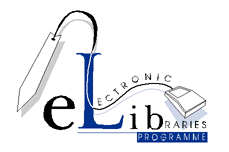SKIP: SKills for new Information Professionals
- Project web site
-
http://www.plym.ac.uk/faculties/research/skip1.htm
- Programme area
-
Training and Awareness
- Contact details
-
Ivan Sidgreaves, Dean of Academic Services, University of Plymouth
Phone: 01752 232006 Fax: 01752 232293
Email: isidgreaves@plymouth.ac.ukPenny Garrod
Phone: 01752 232343 Fax: 01752 232293
Email: pgarrod@plymouth.ac.uk
Project description
as of 4th January 1996
Introduction
This project will seek to explore and illuminate the nature, type and scope of IT skills required by staff in the changing information environment of Higher Education.
Description
Information Technology has radically changed the nature of work, and as a consequence the content and skill base of many jobs require evaluation and redefinition. The impact IT is having on the roles of staff working in library and information services demands particular attention given their pivotal role in the "information family."In higher education, the rapid growth in the demand for electronic based information services to support teaching and research has required library staff to develop new and extended professional skills. Many institutions have also recognised the need to review the organisation and structure of institutional library and computing services to ensure that they can best meet these new challenges. For a growing number this has resulted in some form of organisational convergence, which has, in turn, forced a reappraisal of the traditional division between some of the roles of computing and library professionals, as well as support staff.
Libraries have traditionally recruited staff with high level IT skills into systems related functions. It is now acknowledged that it is necessary to demand appropriate IT skills for a much wider range of functions. The precise nature and type of those skills, the manner in which they relate to more traditional information skills, and the ways in which they might be acquired is often less clear. In converged services, as well as in library services with a strong IT focus, the balance in some post definitions between library and computing skills is often poorly defined, and the ideal candidate for many posts would appear to be some kind of professional "hybrid."
A further important issue and one which may well determine an institution's ability successfully to develop effective information services is the assumption that there are distinct cultural differences existing between the computing and library professions. The one, LIS, has been characterised by its strong professional hierarchy; the other, computing, by the importance it attaches to technological authority. The accuracy of such views and the impact they can have on the success of partnerships between library and computing professionals in higher education may be more imagined than real.
Deliverables
The project aims to:- define the nature and type of IT skills required by LIS staff to support learning, teaching and research in UK higher education;
- evaluate and classify these requirements in terms of job definition, scope, level, skills, and experience;
- produce guidelines which will assist managers both by identifying the requirements for staff development of existing staff and in more precisely defining the scope and nature of new posts; and explore the impact the traditional divisions between computing and library professionals currently have on the organisation, structure, and development of services.
- information professionals by providing a clearer definition and classification of skill requirements with some indication of possible career directions;
- service managers by reassessing and then redefining the traditional library and computing roles within overall information service provision.
- institutions to gain a better understanding of the key issues which will be crucial to the successful development of institutional information services;
- the HE sector to identify factors which might usefully contribute to the effective delivery of institutional information strategies.
Participants
The idea for the project was originally developed at a conference of "merged service" managers in Autumn 1994 and a number of these will be active participants. However, the issues it raises are much broader. It is intended, therefore, to work closely with a variety of HE institutions, including those which have different forms of service convergence and those with free standing library services.Present experience would suggest that these will include Aston; De Montfort; Edge Hill; Keele; Kings College; Leeds Metropolitan; London Business School, Roehampton Institute; Southampton; and Stirling, but at this stage this list should not be seen as being in any way exclusive. An initial survey will be used to identify more clearly those institutions which are likely to make a significant contribution to the project's work.

